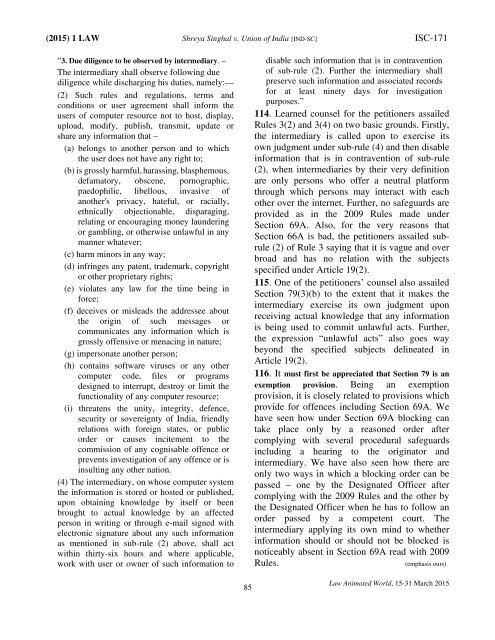Editor: I. Mallikarjuna Sharma Volume 11: 15-31 March 2015 No. 5-6
Martyrs memorial special issue of 15-31 March 2015 paying tributes to Bhagat Singh and other comrades.
Martyrs memorial special issue of 15-31 March 2015 paying tributes to Bhagat Singh and other comrades.
You also want an ePaper? Increase the reach of your titles
YUMPU automatically turns print PDFs into web optimized ePapers that Google loves.
(20<strong>15</strong>) 1 LAW Shreya Singhal v. Union of India [IND-SC] ISC-171<br />
“3. Due diligence to be observed by intermediary. –<br />
The intermediary shall observe following due<br />
diligence while discharging his duties, namely:—<br />
(2) Such rules and regulations, terms and<br />
conditions or user agreement shall inform the<br />
users of computer resource not to host, display,<br />
upload, modify, publish, transmit, update or<br />
share any information that –<br />
(a) belongs to another person and to which<br />
the user does not have any right to;<br />
(b) is grossly harmful, harassing, blasphemous,<br />
defamatory, obscene, pornographic,<br />
paedophilic, libellous, invasive of<br />
another's privacy, hateful, or racially,<br />
ethnically objectionable, disparaging,<br />
relating or encouraging money laundering<br />
or gambling, or otherwise unlawful in any<br />
manner whatever;<br />
(c) harm minors in any way;<br />
(d) infringes any patent, trademark, copyright<br />
or other proprietary rights;<br />
(e) violates any law for the time being in<br />
force;<br />
(f) deceives or misleads the addressee about<br />
the origin of such messages or<br />
communicates any information which is<br />
grossly offensive or menacing in nature;<br />
(g) impersonate another person;<br />
(h) contains software viruses or any other<br />
computer code, files or programs<br />
designed to interrupt, destroy or limit the<br />
functionality of any computer resource;<br />
(i) threatens the unity, integrity, defence,<br />
security or sovereignty of India, friendly<br />
relations with foreign states, or public<br />
order or causes incitement to the<br />
commission of any cognisable offence or<br />
prevents investigation of any offence or is<br />
insulting any other nation.<br />
(4) The intermediary, on whose computer system<br />
the information is stored or hosted or published,<br />
upon obtaining knowledge by itself or been<br />
brought to actual knowledge by an affected<br />
person in writing or through e-mail signed with<br />
electronic signature about any such information<br />
as mentioned in sub-rule (2) above, shall act<br />
within thirty-six hours and where applicable,<br />
work with user or owner of such information to<br />
disable such information that is in contravention<br />
of sub-rule (2). Further the intermediary shall<br />
preserve such information and associated records<br />
for at least ninety days for investigation<br />
purposes.”<br />
<strong>11</strong>4. Learned counsel for the petitioners assailed<br />
Rules 3(2) and 3(4) on two basic grounds. Firstly,<br />
the intermediary is called upon to exercise its<br />
own judgment under sub-rule (4) and then disable<br />
information that is in contravention of sub-rule<br />
(2), when intermediaries by their very definition<br />
are only persons who offer a neutral platform<br />
through which persons may interact with each<br />
other over the internet. Further, no safeguards are<br />
provided as in the 2009 Rules made under<br />
Section 69A. Also, for the very reasons that<br />
Section 66A is bad, the petitioners assailed subrule<br />
(2) of Rule 3 saying that it is vague and over<br />
broad and has no relation with the subjects<br />
specified under Article 19(2).<br />
<strong>11</strong>5. One of the petitioners’ counsel also assailed<br />
Section 79(3)(b) to the extent that it makes the<br />
intermediary exercise its own judgment upon<br />
receiving actual knowledge that any information<br />
is being used to commit unlawful acts. Further,<br />
the expression “unlawful acts” also goes way<br />
beyond the specified subjects delineated in<br />
Article 19(2).<br />
<strong>11</strong>6. It must first be appreciated that Section 79 is an<br />
exemption provision. Being an exemption<br />
provision, it is closely related to provisions which<br />
provide for offences including Section 69A. We<br />
have seen how under Section 69A blocking can<br />
take place only by a reasoned order after<br />
complying with several procedural safeguards<br />
including a hearing to the originator and<br />
intermediary. We have also seen how there are<br />
only two ways in which a blocking order can be<br />
passed – one by the Designated Officer after<br />
complying with the 2009 Rules and the other by<br />
the Designated Officer when he has to follow an<br />
order passed by a competent court. The<br />
intermediary applying its own mind to whether<br />
information should or should not be blocked is<br />
noticeably absent in Section 69A read with 2009<br />
Rules.<br />
(emphasis ours)<br />
85<br />
Law Animated World, <strong>15</strong>-<strong>31</strong> <strong>March</strong> 20<strong>15</strong>



